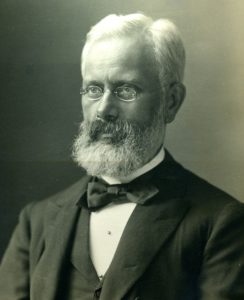KAUFMANN KOHLER (1843- 1926)
Kaufmann Kohler was born on March 10, 1843, in Furth, Bavaria – the son of an Orthodox rabbi. Influenced at an early age by the writings and philosophy of Samson Raphael Hirsch (b. 1808, d. 1883), he pursued his doctoral studies in Berlin and Erlangen.
Although his upbringing and early schooling were Orthodox, Kohler was strongly affected by the teachings of Abraham Geiger (b. 1810, d. 1874), one of the most prominent German leaders of Reform. The radicalism of his doctoral dissertation, one of the earliest examples of the higher criticism of the Bible (analyzing Scripture in light of modern knowledge), made Kohler ineligible to serve in many German-Jewish communities. He immigrated in 1869 to the United States, where he was welcomed by the eminent Reform rabbi David Einhorn (b. 1809, d. 1879), whose daughter he married. Kohler served several prominent congregations in his early years in America: Congregation Beth El in Detroit (1869-79); Chicago’s Sinai Congregation (1871 to 1879); and, in 1879, he succeeded his father-in-law at Temple Beth El, New York.
A creative theologian and a passionate and persuasive speaker, Kaufmann Kohler emerged as one of the spokespersons for American Reform Judaism during its formative years. He is remembered as the “chief architect” of the 1885 Pittsburgh Platform, which set forth American Reform positions on such topics as the idea of God, the Jewish mission, and the need for Jews to be actively involved in social justice causes for the betterment of humankind. This famous platform is considered to be a landmark development in the history of American Judaism.


